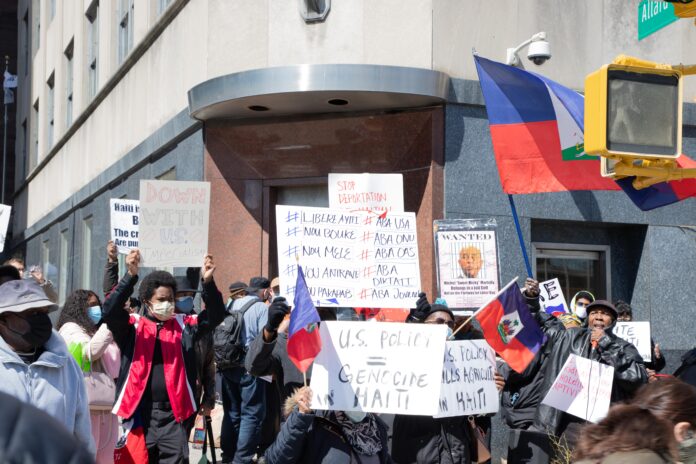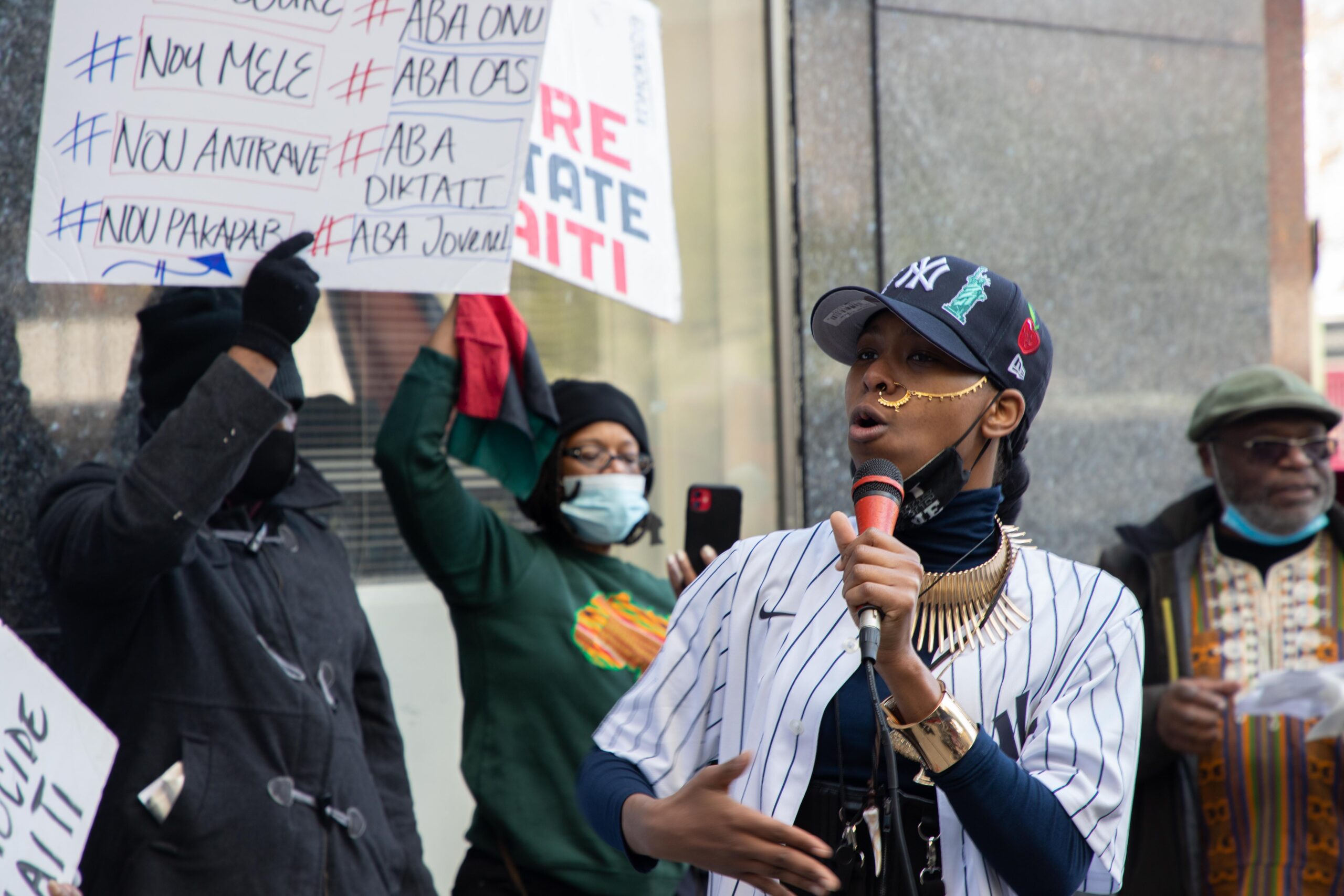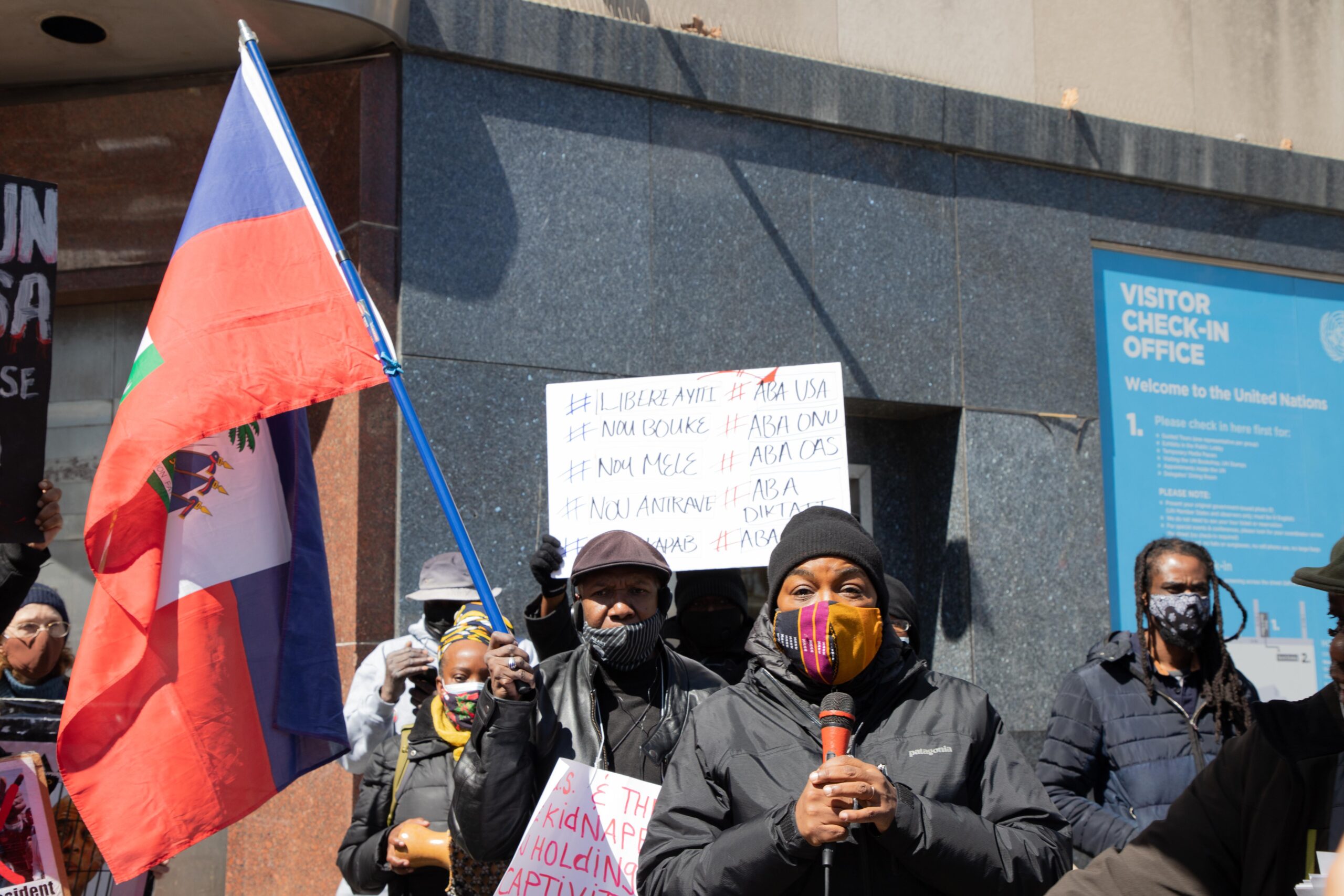
Dozens of Haitian and international activists, convened on Zoom by the Black Alliance for Peace, designated Mar. 27-29 as days of solidarity with the democratic struggle in Haiti against the emerging dictatorship of de facto President Jovenel Moïse.
Members of the Haitian diaspora along with their international allies held rallies in cities across the U.S. and Canada including New York, Miami, Boston, Washington, DC, Atlanta, Montreal, and Ottawa in solidarity with the uprising in Haiti.
Central to all the mobilizations was the demand that Washington end its political and economic support to Jovenel Moïse and his plans to illegally rewrite the Haitian Constitution and hold presidential, parliamentary, and local elections.

In New York on Mon., Mar. 29, a three-hour afternoon rally of almost 100 people, mostly Haitian, was held in front of the U.S. Mission to the United Nations on a sunny, windy day.
Haitian Women for Haitian Refugees, KOMOKODA, Code Pink, and the Party for Socialism and Liberation (PSL) were among the groups which organized the action.
Mar. 29 was the 34th anniversary of the 1987 Haitian Constitution, whose Article 134.2 Jovenel Moïse has flagrantly violated by clinging to power beyond Feb. 7, 2021.
Speakers spoke not only about the deteriorating situation in Haiti but also of the Biden administration’s deportation of 1,300-1,500 Haitians since coming to office, and the need to organize. In Kreyòl, Spanish, and English, the message was clear: fight from within the belly of the beast while the empire faces pressure from the outside.
“When we take one step backwards, they take 100 steps forward.” said well-known activist and singer Jocelyn Gay, referring to the U.S., France, and Canada. “We’re here because we want them to know we’re not happy with their puppet. This country [the U.S.] is a fake democracy and therefore has no business telling us who should run our country. They started with Sweet Micky [President Michel Martelly] as their puppet and continued the same program with Jovenel. Since either of them came to power, has Haiti made one step forward?”
Latino organizers came to show their support and solidarity by sharing their experiences in fighting against oppression. “On the island of Hispaniola, we were taught to hate each other,” said Ali, a young Dominican activist. “You have imperialists that have come to the island to colonize the people, creating division, stigmas, and hate which has lasted for years. We have to break that hate. You’re hating people without understanding the historical significance of where you got that hate from,” he said, referring to Dominicans who harbor anti-Black or anti-Haitian sentiments. “Why would you hate your brothers and sisters who helped you get freedom?”

Haitian drummer, educator, and activist Sky Menesky addressed the problem of “gang” violence in Haiti today. “The young men in Village de Dieu are not the threat to Haiti,” he said, referring to a Port-au-Prince neighborhood where an armed group killed four policemen on Mar. 12. “They are victims themselves. We have to be mindful of that… Everyday we have to stand in solidarity. In how we love, how we talk, and how we congregate with each other… We stand right here, in front of the United Nations.. Haiti symbolizes the real Universal Declaration of Human Rights, that everyone, man or woman, is free. Everyone.”
“Liberté ou la mort! [Liberty or death]” shouted a speaker by the name of Sister Haiti. With a powerful voice coming from her small frame, the crowd fell silent. “I was happy to see all my Black brothers and sisters, whether they were African, Jamaican, or Guyanese. They all know the price we paid for liberty and what it took to achieve it… When one dies fighting, that’s when others understand what it is to be alive, because to live in misery, they feel as though they are not really living.” Then she continued passionately in Kreyòl: “Se pou nou lite jiska nou tout ka viv! Ki lè, lè ap rive pou nou di ‘pa ankò’? Pa yon jounen ankò! Pa yon mwa ankò!” [We must struggle until we all can live. When will the time come for us to say ‘no more’? Not one day more! Not one month more!] The crowd cheered her riveting speech.
It was refreshing that the rally’s speakers drew parallels between the Haitian diaspora’s struggles and those underway in Haiti, highlighting how capitalism exploits the working poor across borders. The rally was a rare occurrence, but hopefully the beginning of a trend for inter-generational discourse and organizing among the revolutionary-minded in the Haitian diaspora.
Ayibobo.










